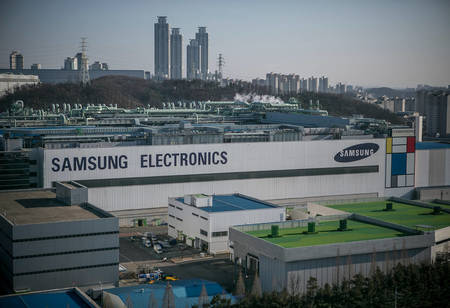
Samsung Electronics Marks its Profit Rise on Chip in 4th Quarter


Samsung Electronics has announced that its fourth-quarter operating profit is likely growing 26 percent as the result of coronavirus pandemic drove remote working and TV-watching fuelled sales of chips and display panels.
However, profit likely fell about 27 percent when compared with the preceding quarter, according to the analysts. The weaker smartphone sales, marketing costs, and a strong won versus the U.S. dollar.
Samsung, the world's biggest memory chip supplier and maker of smartphones, also said revenue likely rose 1.9 percent to 61 trillion won.
The company provides only estimates of quarterly revenue and operating profit in its preliminary earnings release. Full earnings are due later this month.
Alongside, the nine trillion won ($8.24 billion) estimate provided by the South Korean tech giant for profit in the December quarter was in line with a 9.1 trillion won analyst forecast by Refinitiv SmartEstimate. That analyst forecast was trimmed back from 9.5 trillion earlier in the week.
Park Sung-soon, an analyst at Cape Investment & Securities says, "Work-from-home will become entrenched. Samsung's supply comments, and investments in non-memory chips, will be issues to watch out for when full results are announced."
However, Park said analysts would be closely watching for an update on an earthquake in Taiwan last month that briefly stopped memory chip production at rival DRAM makers. While demand usually rises in response to a supply disruption, researcher TrendForce said the earthquake did not seem to have caused any tangible capacity losses.
Analysts expect Samsung to report a jump in memory chip shipments in the December quarter, compared with the prior quarter, offsetting lower prices.
Those prices will likely rebound in the first half of this year, analysts said, as data center customers return to buying chips, as well as demand from 5G smartphones, notebooks, graphics, and automotive.
Samsung's share price has been boosted by a global shortage of chips that have forced firms to scramble to secure production capacity from contract chip manufacturers or foundries. Samsung Electronics shares rose 1.3 percent in morning trade, compared to a 2.1 percent rise in the wider market, having risen about 56 percent since September.
South Korea expects semiconductor shipping to rise more than 10 percent in 2021, as the pandemic encourages companies to add bandwidth for remote work and consumers to buy devices.